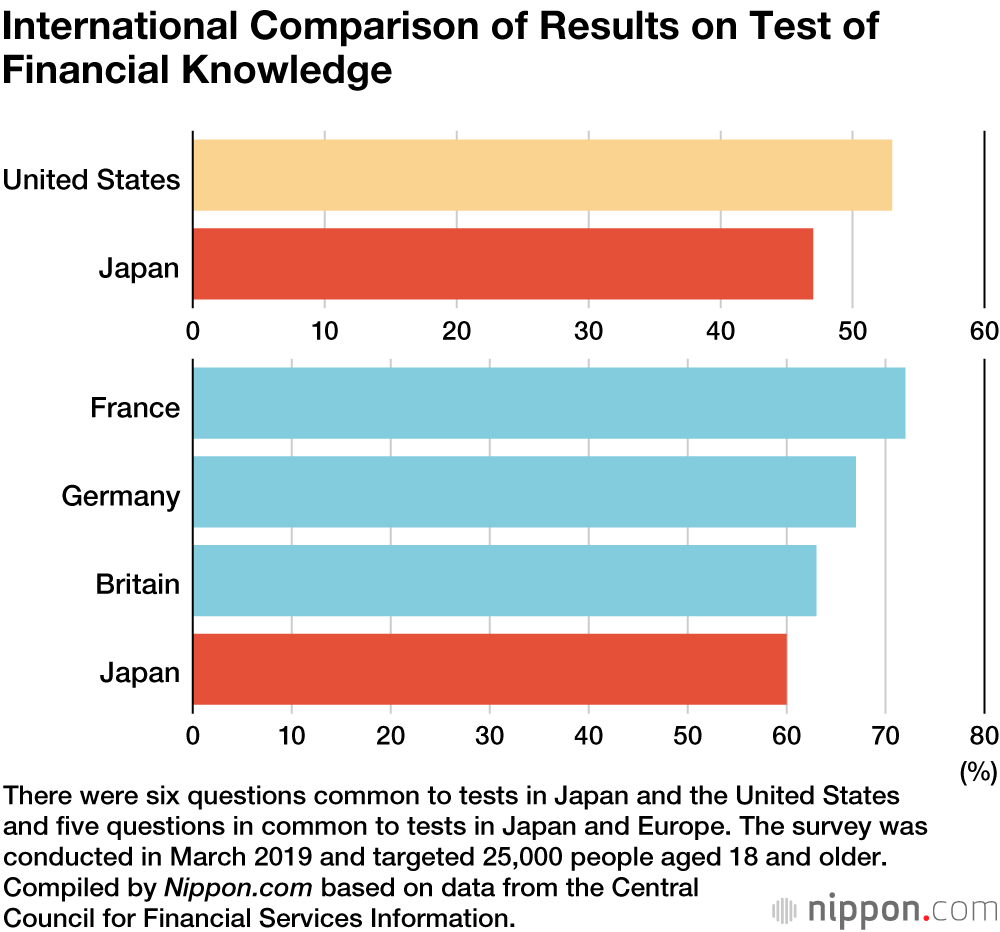
Japanese Lag Somewhat Behind Americans and Europeans in Financial Savvy
Economy- English
- 日本語
- 简体字
- 繁體字
- Français
- Español
- العربية
- Русский
Japanese respondents showed a slight year-on-year increase in financial literacy in a 2019 survey by the Central Council for Financial Services Information. The percentage of correct answers to the 25-item test on such topics as household financial management, life planning, and financial transactions rose to 56.6%, as compared to 55.6% in 2018.
For six multiple-choice questions that were also included in an American survey, there were 53% correct answers in the United States, as compared to 47% in Japan, while for five questions in common with the test administered in European countries, Japan averaged 60%, which was lower than Britain, Germany, and France.
Two questions for which respondents in the United States scored higher than those in Japan were the following: “Suppose you have ¥1 million [$100 in the US survey] in a savings account earning 2% interest a year. After five years, how much would you have?” (Japan: 44% / United States: 75%) and “Imagine that the interest rate on your savings account is 1% a year and inflation is 2% a year. After one year, would the money in the account buy more than it does today, exactly the same or less than today?” (Japan: 55% / United States: 59%). In the case of Japan, which has been in a deflationary period for so long that almost no interest is earned on savings, such questions themselves may have seemed a bit removed from reality.
| Japan | US | |
|---|---|---|
| Suppose you have $100 in a savings account earning 2% interest a year. After five years, how much would you have? | 44% | 75% |
| Imagine that the interest rate on your savings account is 1% a year and inflation is 2% a year. After one year, would the money in the account buy more than it does today, exactly the same or less than today? | 55% | 59% |
| True or false? A 15-year mortgage typically requires higher monthly payments than a 30-year mortgage but the total interest over the life of the loan will be less. | 70% | 75% |
| True or false? Buying a single company's stock usually provides a safer return than a stock mutual fund. | 47% | 46% |
| If interest rates rise, what will typically happen to bond prices? Rise, fall, stay the same, or is there no relationship? | 24% | 28% |
| Suppose you owe $1,000 on a loan and the interest rate you are charged is 20% per year compounded annually. If you didn’t pay anything off, at this interest rate, how many years would it take for the amount you owe to double? | 42% | 33% |
Compiled by Nippon.com based on data from the Central Council for Financial Services Information. Questions taken from the US survey administered by the FINRA Investor Education Foundation.
Only 8.5% of Japanese respondents said that they had received some sort of financial education at school regarding household finances and life planning, while 67.2% said that such education should be carried out. According to the survey, those with less financial knowledge are more likely to not compare financial products when taking out a loan and to not understand the characteristics of the foreign currency deposits they purchase.
(Translated from Japanese. Banner photo © Pixta.)
